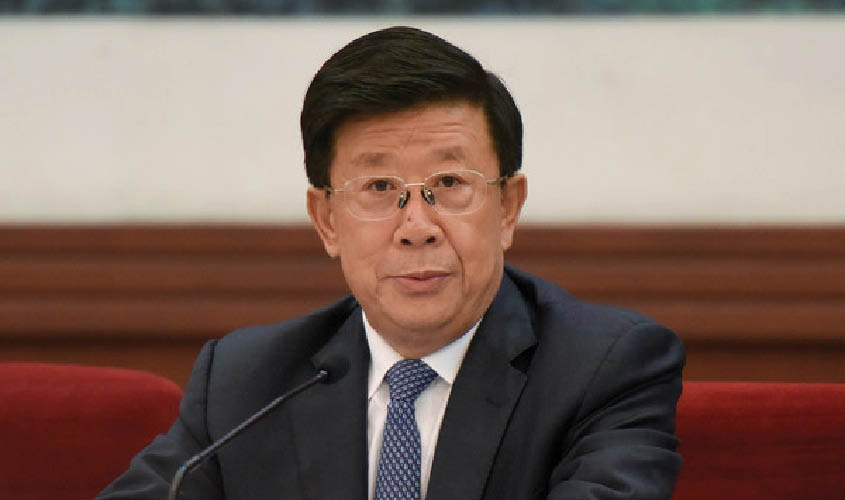Chinese leadership has been paying increased attention to Tibet. Zhao Kezhi’s briefing to Xi Jinping will be an important input in shaping policy on India.
Obviously high on the agenda of Chinese State Councillor and Minister of Public Security Zhao Kezhi and his 20-member delegation, which arrived in India on 22 October before going on to Bangladesh, were Tibet-related issues including that of the Dalai Lama. Notwithstanding that the visit was part of Beijing’s effort to portray that ties between China and India are improving consequent to the “informal” meeting between Prime Minister Narendra Modi and Chinese President Xi Jinping at Wuhan, Chinese troops intruded into Arunachal Pradesh just days prior to Zhao Kezhi’s arrival. There was an intrusion in Demchok (Ladakh) by Chinese troops during the Chinese Defence Minister’s visit last month too, and they withdrew only weeks after his departure. It was good that India did not genuflect to avoid giving imagined offence to Chinese sensitivities and Kiren Rijiju, Minister of State for Home and Member of Parliament from Arunachal Pradesh, attended the meetings. Important for Chinese President Xi Jinping will be Zhao Kezhi’s discussions on the issues of Tibet and the Dalai Lama and his assessment of the likely results of India’s upcoming national elections.
In addition to meeting his host Home Minister Rajnath Singh, 64-year-old Zhao Kezhi was received by India’s National Security Advisor and Prime Minister. A security cooperation agreement was signed, the first between India and China. The agreement covers areas like intelligence sharing, exchange programmes, sharing of best practices, cooperation in disaster mitigation, besides others. In material terms, though, there is likely to be negligible, if any, cooperation in these areas.
While there is no possibility of substantive cooperation in counter-terrorism so long as China remains protective about Pakistan and seeks to insulate it from accusations by other countries, the Chinese delegation would have again pressured India to re-open talks with the new government in Pakistan and “resolve” the Kashmir issue. It would have emphasised the importance of the China Pakistan Economic Corridor and need to ensure its security.
The Tibet issue undoubtedly ranked high on the Chinese delegation’s agenda. The visit came in the midst of China’s ongoing campaign inside Tibet to expand Party presence, strengthen surveillance by security forces and intensify efforts to persuade Tibetan Buddhist monks and nuns to “adapt” Buddhism to Chinese socialism. In addition to reasserting China’s position, it is likely Zhao Kezhi sought to elicit views on the Dalai Lama and urged curbs on the Dalai Lama’s set-up in Dharamshala, accusing it of infiltrating and carrying out anti-China activities inside Tibet. The Chinese have an interest in the situation surrounding Uyghen Thinley Dorje, recognised as the Karmapa of the Karma Kagyu sect by the Chinese government and Dalai Lama and who “escaped” from Tsurphu Monastery in Tibet in 2000. China’s curiosity would have been accentuated by his meeting in rural France with Thaye Thinley Dorje, another contender, which concluded on 11 October. The recent news reports—many inspired—suggesting that Uyghen Thinley Dorje was unhappy in India, that he had acquired a passport of the Dominican Republic etc., would have whetted Chinese interest as also that he continues to be abroad. There are reliable reports that China made conciliatory overtures to Uyghen Thinley Dorje, while he was in New Jersey. The Tibetans exiled in India also demonstrated their presence by staging a protest on 22 October near the Chinese embassy.
Clear pointers to the importance of Tibet-related issues were the inclusion in the delegation of Zhang Hongbo, Director of Public Security of the Tibet Autonomous Region (TAR) and Ms Hou Yanqi, of China’s Ministry of Foreign Affairs (MoFA) who has served in its Department of External Security Affairs, which also looks after matters relating to Tibetans outside China and Wu Wei, Counsellor in MoFA’s Department of External Security Affairs.
Zhang Hongbo, an ethnic Han who was born in Sichuan and joined the Chinese Communist Party (CCP) in 1985, has been working in TAR since at least 1982, indicating he is either an “Aid Tibet” cadre from Sichuan or that he grew up in Tibet. He has extensive experience in security work and his last appointment was as Mayor of Shigatse, one of TAR’s two largest cities and also the traditional seat of the Panchen Lama, till July 2018 when he was appointed Director of TAR Public Security. He would have detailed knowledge of Tibetan issues including the interactions between Chinese authorities and Tibetan Buddhist monks in India and elsewhere. Similarly pertinent is the inclusion of 1970-born Ms Hou Yanqi. An Urdu-speaking specialist in Pakistan and Afghanistan affairs, she has served in the Department of External Security Affairs of China’s Ministry of Foreign Affairs, which would have given her insights into issues concerning the Tibetans and Uyghurs.
The Chinese leadership has, in recent years, been paying increased attention to Tibet. Zhao Kezhi’s briefing to Xi Jinping will be an important input in shaping policy on India as, in addition to being Minister for Public Security, he is a long-time confidant of Xi Jinping.
Jay Ranade is former Additional Secretary in the Cabinet Secretariat, Government of India and is presently President of the Centre for China Analysis and Strategy. The views expressed are personal.

